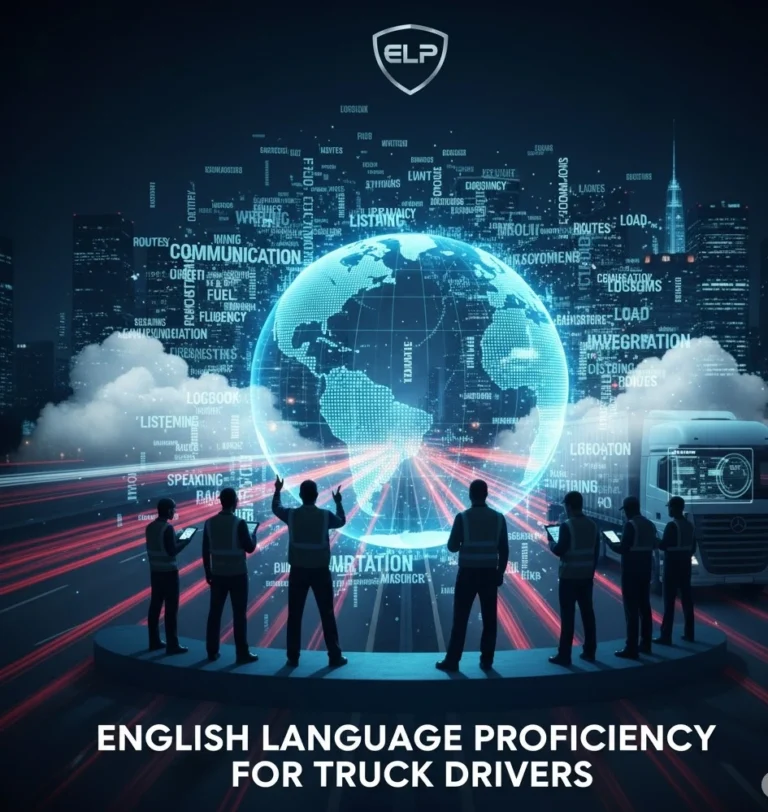The U.S. Department of Transportation (USDOT) has announced that it will withhold more than $40 million in federal highway safety funds from California for failing to enforce national English Language Proficiency (ELP) standards for commercial truck drivers.
The U.S. Department of Transportation (USDOT) has announced that it will withhold more than $40 million in federal highway safety funds from California for failing to enforce national English Language Proficiency (ELP) standards for commercial truck drivers. The decision underscores the growing tension between Washington and Sacramento — and reignites a crucial debate about road safety and communication behind the wheel.
Federal Action After Months of Warnings
Transportation Secretary Sean Duffy confirmed that the Federal Motor Carrier Safety Administration (FMCSA) will withhold $40,685,225 from the Motor Carrier Safety Assistance Program (MCSAP). This program finances roadside inspections, law enforcement training, traffic enforcement, and public safety campaigns across all 50 states.
According to Duffy, California was given ample warning. In August 2025, the USDOT formally notified California, Washington, and New Mexico that they had 30 days to comply with the English enforcement mandate for commercial drivers. While Washington and New Mexico agreed to align with federal standards, California refused, arguing that its local regulations were sufficient and that the federal mandate was “discriminatory.”
Federal Investigation Found Serious Failures
The FMCSA investigation revealed a pattern of noncompliance and neglect. From June 25 to August 21, 2025, California conducted roughly 34,000 roadside inspections in which at least one violation was recorded. However, only one inspection resulted in an English proficiency violation leading to a driver being placed out of service.
Even more alarming, federal investigators found that at least 23 drivers previously disqualified in other states for ELP violations were later inspected in California — yet allowed to continue operating. According to USDOT, the state “failed to adopt and enforce compatible ELP laws and regulations”, allowing unqualified drivers to remain on the road.

“Safety Starts With Communication”
Secretary Duffy defended the decision in strong terms:
“Wyoming families, California families — all Americans — deserve safe highways,” he said. “Truck drivers must be able to read road signs, understand traffic laws, and communicate clearly with law enforcement and emergency responders. That’s common sense.”
He added:
“I put states on notice this summer: enforce the Trump Administration’s English language requirements, or the checks stop coming. California is the only state in the nation that refuses to ensure big rig drivers can communicate effectively. This is a fundamental safety issue that impacts everyone on America’s roads.”
The Trump Executive Order and the English Rule Reinstatement
The controversy traces back to June 2025, when President Donald Trump signed an Executive Order reinstating English proficiency as an enforceable safety requirement for commercial drivers. The order reversed a 2016 federal memo that had discouraged law enforcement from placing drivers out of service for ELP violations.
Under the new rule, English proficiency once again counts as a disqualifying violation: a driver who cannot adequately read traffic signs or communicate in English may be immediately suspended until they meet the requirement.
Industry experts and safety advocates argue that the rule is not about discrimination, but about clear communication in critical moments — during inspections, emergency stops, or accidents where seconds can save lives.
California’s Defiance and the Political Divide
California officials, however, continue to resist federal enforcement. Governor Gavin Newsom’s administration has stated that the rule “unfairly targets immigrant drivers” and that the state “will not participate in discriminatory enforcement practices.”
The USDOT counters that no state has the authority to ignore federal highway safety laws, particularly those designed to protect the traveling public. The agency maintains that it is “not about politics — it’s about safety.”
By refusing to comply, California risks losing significant federal funding used to support its highway patrol, inspection programs, and safety audits. Duffy warned that the withheld funds will not be restored until California “adopts and actively enforces” a law or regulation compatible with the federal ELP standard.
Why English Proficiency Matters for Trucking Safety
Experts emphasize that understanding English on the road can mean the difference between life and death. A truck driver who cannot read a detour sign, understand weight restrictions, or follow police instructions during an emergency creates potential danger not only for themselves, but for everyone around them.
The National Highway Traffic Safety Administration (NHTSA) estimates that miscommunication and failure to follow signage contribute to thousands of highway accidents each year. Ensuring that all commercial drivers can communicate effectively with law enforcement, dispatchers, and emergency personnel is seen as a baseline requirement for modern road safety.
A Battle Over Compliance — and Control
As of mid-October, California remains the only state openly defying the federal rule, framing the issue as one of “state sovereignty” and “worker inclusion.” But for federal regulators, the matter is simple: safety cannot depend on political ideology.
Until California changes its stance, the $40 million in MCSAP funding will remain frozen — a strong message from Washington that, on America’s highways, communication saves lives.

Frozen Roads After Bomb Cyclone: Black Ice, Record Snow and High Risk for Trucks
Frozen roads continue to disrupt freight transportation following the impact of a powerful bomb cyclone, leaving behind black ice, highway shutdowns, power outages, and dangerous winter driving conditions stretching from the Gulf Coast to New England.

Lunar New Year 2026: Ancient Traditions, Renewed Energy, and Massive Celebrations
Lunar New Year 2026 begins on February 17 under the sign of the Fire Horse and is marked by spiritual rituals, family reunions, and large-scale celebrations in both China and the United States, especially in California.

Freedom 250 Grand Prix: How Logistics and Transportation Will Power the Race in Washington
The first-ever IndyCar street race in Washington, D.C., scheduled for August 21–23, will headline the United States’ 250th anniversary celebrations — and it will trigger a massive transportation, freight, and urban logistics operation behind the scenes.

Groundhog Day: What It Means for Trucking When “Phil Sees His Shadow”
The forecast from America’s most famous groundhog is calling for more winter — and that’s an important signal for the trucking industry and cold-season route planning

Love on the open road: the best dating apps for truckers
If you’re looking for someone to go the long haul with, here are the best dating apps for truck drivers. They say love is everywhere…

The most congested cities in the U.S. and the world in 2025
The annual TomTom Traffic Index produces a ranking of the most congested cities in the world. The annual TomTom Traffic Index presents an analysis of
